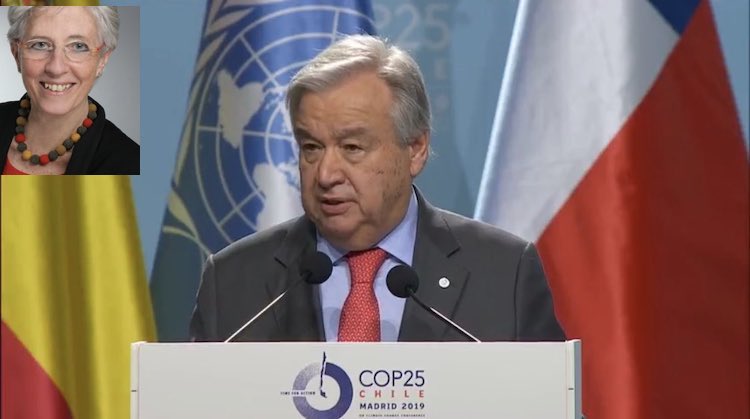Viewpoint by Inge Kaul*
BERLIN (IDN) – In his opening address to COP25 UN Secretary-General António Guterres warned that, in the field of climate change, we are fast approaching the point of no-return and that, therefore, “our war against nature must stop”. He added that “that is possible”. Only, what “is still lacking is political will”. So how to summon the political will to act?
When I heard the UN Secretary-General referring to “war against nature”, a possible answer to this question immediately sprang to my mind: In order to address and resolve problems resulting from the violation of planetary boundaries we could perhaps follow proven policy practices that the UN established in order to help parties’ transition from war caused by violations of national borders and other situations of conflict, fragility and violence to conditions that allow peace to be created and sustained.
Certainly, climate change mitigation and adaptation deserve the same priority and privilege that we accord to conventional peace and security issues, especially the privilege of benefiting from relatively predictable pooled financing, that is, assessed contributions from UN member states – analogous to those collected for conventional peacekeeping operations.
Bottom-up approaches and self-commitments by state and non state actors worldwide are indispensable. However, experience shows that, again and again, the sum of these myriad individual activities does not reach up to what is actually required to avoid the point of no-return that, as the UN Secretary-General stressed, is fast hurtling towards us. Progress needs to be accelerated and scaled up urgently.
Assessed contributions to finance ‘peace with nature’ (PwN) operations could inspire the necessary steps towards climate change mitigation and adaptation. They would also generate resources needed to incentivize efficient providers of key inputs to climate change mitigation to do more than they would do if they were only guided by their particular national, public or private self-interests. At present, we lack such a global public incentive policy. And, therefore, despite all well-meaning interventions, we continue to fail in actually resolving the climate challenge we confront.
We now need to assume collective responsibility for going the extra mile from addressing to actually resolving climate challenge – making and maintaining peace with nature. Such collective responsibility would be in our collective self-interest, because the only alternative to collective responsibility is crossing the tipping point that would bring to naught our prior investments in climate change mitigation and, most importantly, threaten life on earth.
So, maybe, as a possible follow-up step to his inspiring COP25 statement, the UN Secretary-General could consider convening a high-level expert group to further explore the idea of moving from the present ‘war on nature’ to ‘peace with nature’. The expert group would, no doubt, keep in mind the core lesson we have learned in the conventional field of peacebuilding – that creating sustainable peace requires building synergies among peace, humanitarian and development actions.
And it would surely focus on how to ensure that the resources additionally generated through the proposed assessed contributions do not crowd out current and promised future efforts but foster, in a systematic and carefully targeted way, interventions that would otherwise not happen and thus not allow us to achieve –and maintain – peace with nature.
Thus, if designed in line with agreed principles of global fairness and justice, the assessed PwN contributions could be an efficient and effective way of ensuring, in combination with all other ongoing efforts, that we actually achieve carbon neutrality by 2050 and, thereby, lay the foundation for global sustainable growth and development for all.
* Inge Kaul is an adjunct professor at the Hertie School of Governance, Berlin, Germany and advisor to various governmental, multilateral and non-profit organizations on policy options to meet global challenges. She was the first director of UNDP’s Human Development Report Office, from 1989 to 1994.
Watch UN Chief’s opening address to COP25 on video on webtv.un.org. [IDN-InDepthNews – 05 December 2019]
Photo: Collage of Inge Kaul’s photo (left top – Credit: UNESCO) mounted on UN Chief Guterres’ addressing the opening of COP25 (Credit: twitter.com/antonioguterres)
IDN is flagship agency of the International Press Syndicate.
facebook.com/IDN.GoingDeeper – twitter.com/InDepthNews

